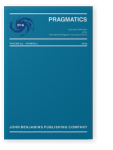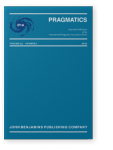Angeliki Alvanoudi
List of John Benjamins publications for which Angeliki Alvanoudi plays a role.
2025 Pragmatic and prosodic aspects of the negative directive ðe mu les? (‘tell me’) in Greek conversation: (‘Tell me’) in Greek conversation Multimodal Communication from a Construction Grammar Perspective, Nikiforidou, Kiki and Mirjam Fried (eds.), pp. 285–312 | Chapter
This study examines the pragmatic and prosodic aspects of the Greek negative directive ðe mu les? (neg pn.1sg.gen say.2sg.prs) ‘tell me’ (lit. ‘don’t you tell me?’), bringing together conversation-analytic informed Interactional Linguistics and Construction Grammar, and drawing on naturally… read more
2024 Conventionalized impoliteness formulae in third-party assessments: Uniting offenders against (national) others Journal of Language Aggression and Conflict: Online-First Articles | Article
The paper examines the ideological work accomplished by the use of conventionalized impoliteness formulae in third person reference, when the person being criticized or brought into disrepute is not present in the here-and-now of interaction. Drawing on Interactional Linguistics and data from… read more
2024 Polar answers: Accepting proposals in Greek telephone calls Pragmatics 34:3, pp. 447–472 | Article
The purpose of this paper is to examine the forms and functions of answers to proposals for joint action, implemented through polar interrogatives, in Greek telephone calls. Our analysis indicates a distinct functional distribution of three types of accepting answers to such proposals.… read more
2022 Review of Heine, Kaltenböck, Kuteva & Long (2021): The Rise of Discourse Markers Journal of Historical Linguistics 12:3, pp. 504–510 | Review
This article reviews The Rise of Discourse Markers read more
2022 Polar answers and epistemic stance in Greek conversation Pragmatics 32:1, pp. 1–27 | Article
This conversation analytic study examines the linguistic resources for indexing epistemic stance in second position in question sequences in Greek conversation. It targets three formats for providing affirming/confirming answers to polar questions: unmarked and marked positive response tokens,… read more
2021 The discourse marker ale in Bislama oral narratives Journal of Pidgin and Creole Languages 36:2, pp. 264–297 | Article
This study takes us to the South Pacific and concentrates on Bislama, one of the dialects of Melanesian pidgin (Siegel 2008: 4) and one of the official languages of Vanuatu. We take a discourse analysis perspective to map out the functions of ale, a conspicuous discourse marker in conversations… read more
2016 Aspects of the meaning of gender: Introduction International Journal of Language and Culture 3:1, pp. 56–67 | Article





